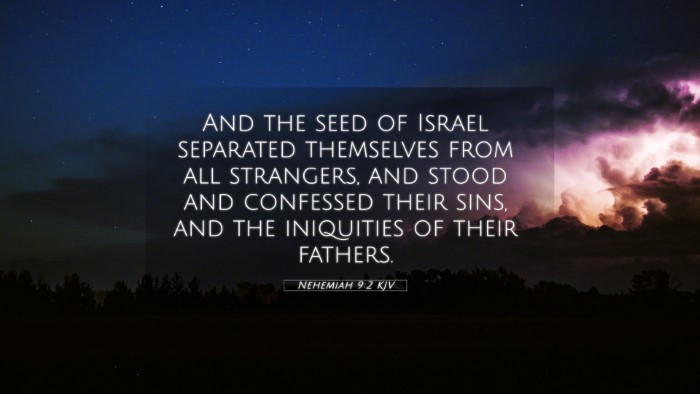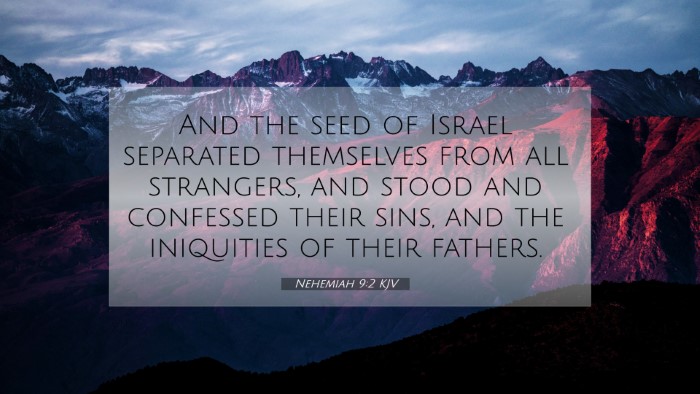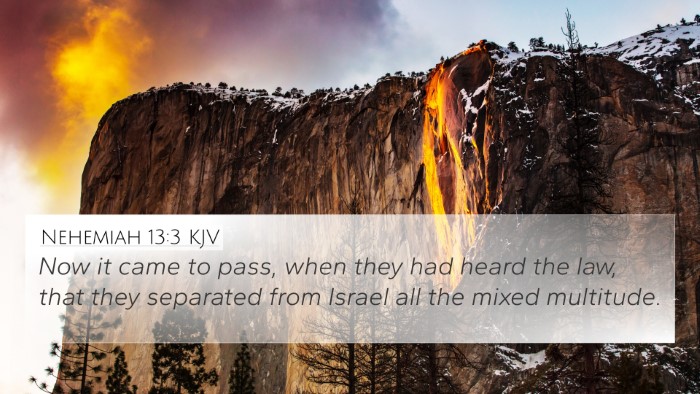Understanding Nehemiah 9:2
Nehemiah 9:2 states: "And the seed of Israel separated themselves from all strangers, and stood and confessed their sins, and the iniquities of their fathers."
Summary of Nehemiah 9:2
This verse describes a pivotal moment in the life of the Israelites after their return from exile. In this context, the people of Israel take an important step to separate themselves from foreign influences and acknowledge both their sins and the iniquities of their ancestors. This act of separation symbolizes a commitment to holiness and fidelity to Yahweh.
Meaning and Interpretation
-
Separation from Strangers:
Matthew Henry emphasizes the importance of separation from non-Israelite influences as a means of spiritual purity. This act signifies a return to their identity and relationship with God.
-
Confession of Sins:
Albert Barnes notes that this public acknowledgment of sin is crucial for restoration. It is a prerequisite for receiving God's mercy and favor. By confessing, the Israelites demonstrate humility and a desire for reconciliation with God.
-
Recognition of Ancestral Iniquities:
Adam Clarke points out that the acknowledgment of the sins of their forefathers reflects a communal understanding of guilt. The Israelites realize that their struggles stem not just from personal failings but also from a collective history of disobedience.
Contextual Significance
This verse is set within a broader narrative of communal revival and repentance. After returning from Babylonian exile, the Israelites are keen to restore their covenant relationship with God. Nehemiah, along with Ezra, plays a significant role in teaching and reforming the people, and this verse encapsulates a moment of collective accountability.
Cross-References
Nehemiah 9:2 can be linked to several other biblical texts, providing a richer understanding of its significance:
- Ezra 10:1: Similar themes of confession and repentance are seen as the people gather to address their sins.
- 2 Chronicles 7:14: A promise of healing and restoration if the people humble themselves and turn from their wicked ways.
- Isaiah 59:2: Discusses how sin separates people from God, aligning with the theme of separation in Nehemiah 9:2.
- James 4:8: Encouragement to draw near to God, supporting the idea of separation from worldly influences.
- Psalm 51:1-4: A penitential psalm expressing sorrow for sin and the need for forgiveness, echoing the confession aspect.
- Romans 3:23: The acknowledgment of collective sinfulness, which relates to the themes in Nehemiah.
- Leviticus 20:26: God's call for Israel to be holy, further emphasizing the need for separation from the nations.
- Lamentations 3:39: The idea that individuals should bear the consequences of their sins connects with the acknowledgment of past iniquities.
- Revelation 18:4: A call to separate from sinful influences, mirroring the Israelite resolve in Nehemiah 9:2.
- Matthew 3:6: John the Baptist's call for repentance parallels the call for confession made in Nehemiah.
Thematic Connections
Nehemiah 9:2 draws on themes prevalent throughout the Scriptures, including the acknowledgment of sin, the importance of repentance, and the call for a holy life. The Israelites’ actions reflect a deeper commitment to God’s covenant, which resonates with various passages across both the Old and New Testaments.
Cross-Referencing Biblical Texts
For those studying the connections between Bible verses, utilizing a Bible concordance or a cross-reference Bible study guide can greatly enhance comprehension. Understanding the links between Nehemiah 9:2 and other scriptures helps illuminate the overarching narrative of redemption and the necessity of repentance.
Conclusion
In summary, Nehemiah 9:2 serves as a powerful reminder of the need for spiritual integrity and collective confession. It encourages believers to reflect on their own lives, acknowledge their sins, and seek restoration with God. This verse not only stands alone but also interacts profoundly with many other Bible verses, showcasing the interconnectedness of Scripture and the enduring themes of repentance and holiness.
Final Thoughts
Utilizing tools for Bible cross-referencing can further aid in understanding how these themes resonate throughout the Bible, offering profound insights for personal study, sermon preparation, or group discussions. By exploring these connections, one can deepen their understanding of God's Word and its applicability in life today.


















